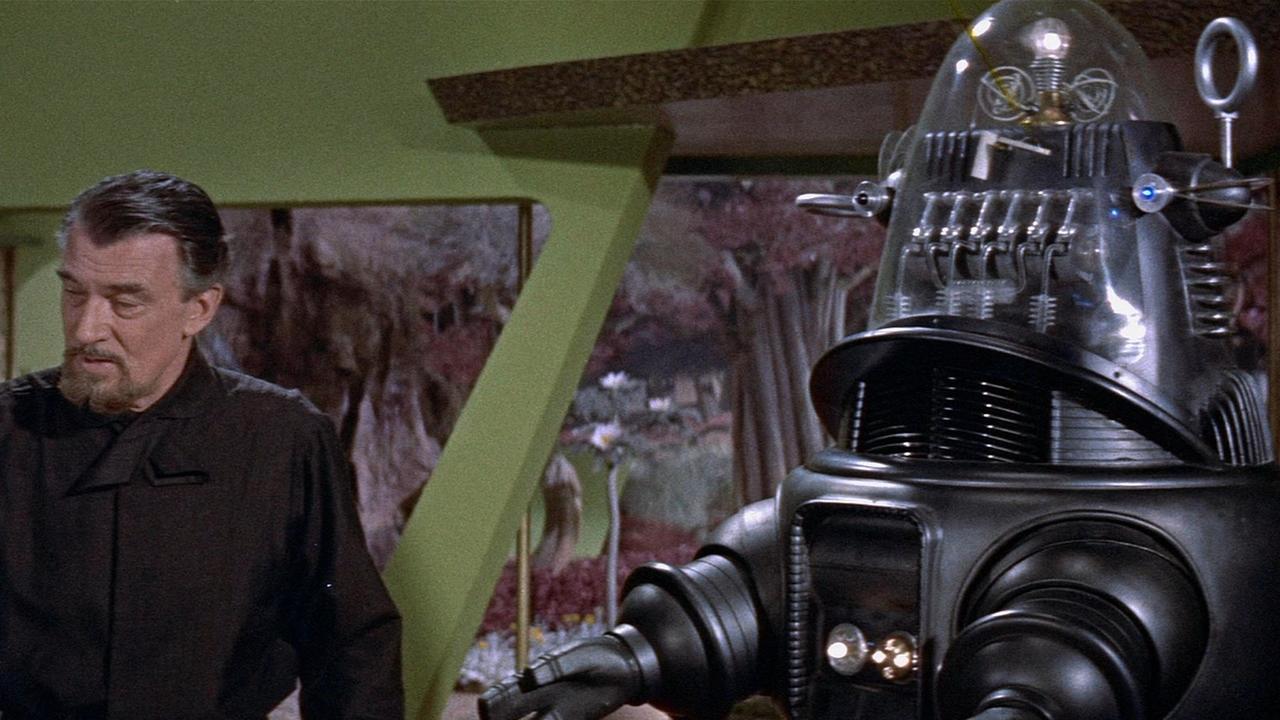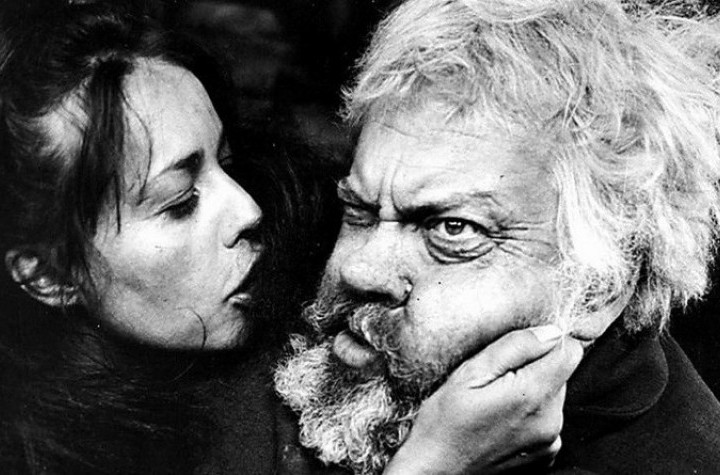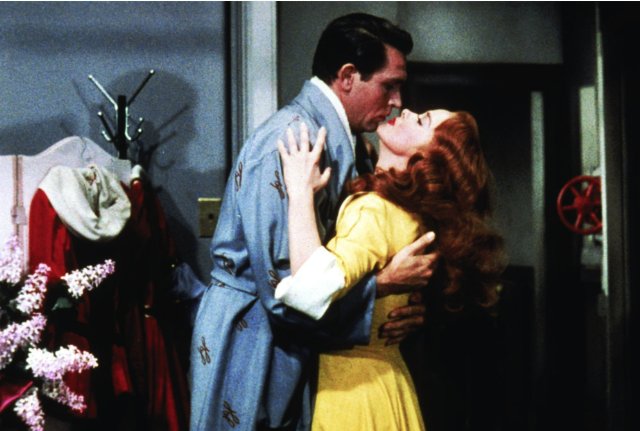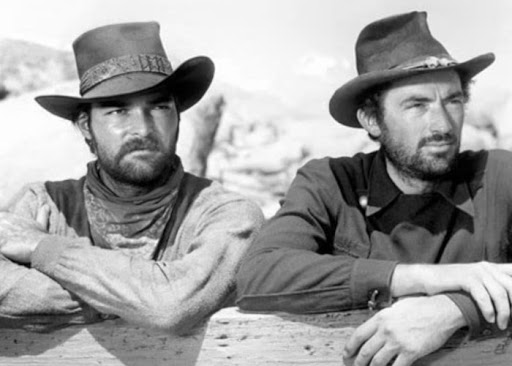6. Forbidden Planet (1956) inspired by Shakespeare’s Tempest

This film is another loose adaptation of Shakespeare’s Tempest. Like Shakespeare’s play, this film is set in a foreign location that is isolated from the rest of the world. The owner of the island is a man who holds prominence as a well-educated person with a great knowledge and mastery of technology. The servant Ariel in Shakespeare’s Tempest that is summoned to help Prospero work his magic and manipulate Miranda and Ferdinand is played in the film by the robot named Robby.
In the play, Ariel is a magic spirit who lives on the wind and in the air. When Robby appears on screen for the first time in this film, he stirs up a cloud of dust, arriving on a cloud, just like Ariel. On Shakespeare’s island lives a monster named Caliban who is 38 times called “monster” in the play. For the film version the remote island features a native creature named, fittingly, “The Monster” who, like Caliban, wants to destroy anything he can. The Monster is thwarted in his plans by Mobius who, like Prospero, uses his vast knowledge and technical magic to fight back against Caliban.
7. My Own Private Idaho (1991) based on Shakespeare’s Henriad plays

In Shakespeare’s Henry IV Part 1, Henry IV Part 2, and Henry V, we see a young Prince Henry step out on his own to try and find his place in the world. He rejects the definition of responsibility laid out for him at home and seeks refuge with the poor, destitute, and disreputable of England’s slums. The character of Falstaff forms for the young Prince Hal a kind of misplaced father figure, standing in for the King that Prince Hal rebels against. When the King dies, Hal becomes Henry V, and chooses to step into that responsibility, publicly rejecting the family he had created with Falstaff in an excruciatingly sad scene of rejection in Shakespeare’s Henry V.
The film, My Own Private Idaho, places this storyline in a very modern context, testing the boundaries of what was then considered decent to place on film when it was created, showing two young men going through the same sense of self doubt and aimless drifting through life. The character of Scott in this film stands in for Henry, and Scott, like Hal, chooses poorly when it comes to friends. The leader of the slums is a man named Bob, who both of these young men adopt as a kind of stand in for the father figures they see as absent in their lives. Featuring themes of male prostitution contrasted with the female prostitution that appears in Shakespeare’s plays, the themes of sexual deviation as a marker for a disreputable life are similar.
Director Van Sant takes the adaptation of Shakespeare a bit far in modernizing the dark side of Shakespeare’s Henriad plays, but are still accurate in their application. In Shakespeare’s play, Hal makes promises to Falstaff that are ultimately broken when Hal chooses to become the King of England. Similarly, in this film, Scott rejects Bob as his father figure, chooses to inherit the money from his biological father, and transform into a man who leaves the slums behind and assumes the responsible role he was destined to hold. Like Hal in Shakespeare’s Henriad series who is pained but determined in his rejection of Falstaff, we see Scott acknowledge the struggle emotionally to make the choice to leave Bob and the others behind, but his decisions and convictions about those choices, are firm.
8. Chimes at Midnight (1965) a retelling of Shakespeare’s Henriad plays

Taking the title from a line in Shakespeare’s Henry IV Part II, when Falstaff says “We have heard the chimes at midnight, Master Shallow” the film is a conflation of several plays, but adapts the direct story of Shakespeare’s Henriad series to film. Orson Welles plays Falstaff, and leads a band of characters that bring Shakespeare’s Prince Hal, Henry IV, Henry V, Doll Tearsheet, and Mistress Quickly to the big screen.
The film picks up after the death of Richard II, who has been killed by Henry IV that now takes his throne of England. The heir of Richard II, Edward Mortimer, is imprisoned and when Hotspur (Mortimer’s cousin tangentially) asks the King to release Mortimer, the King refuses. This refusal prompts Hotspur to orchestrate a coup to overthrow the newly crowned King. We see the young Prince Hal drinking and carousing with the slum of the earth in brothels and alehouses.
Falstaff leads the crowd at Boar’s Head Tavern (and actual tavern that was popular in Shakespeare’s lifetime). Prince Hal vows to kill Hotspur for his insurrection against the King, and the two sides meet at the Battle of Shrewsbury where Hal kills Hotspur in a duel during the fight. Falstaff hides as a coward during the battle, and finds the body of Hotspur afterwards, not knowing Hal has killed him, and brings the dead body to the King, claiming to have killed Hotspur himself. The King disbelieves Falstaff’s rouse. The King falls ill after the battle and ultimately dies with young Hal promising to be a good King. As the new King Henry V, Hal denounces Falstaff at his coronation in a very painful, public, rejection scene. This film has not been surpassed in its’ adaptation of Shakespeare’s Henriad plays onto film. It stands today as arguably the best representation of Shakespeare’s works on film.
9. Kiss Me, Kate (1963) inspired by Shakespeare’s Taming of the Shrew

Winning the Tony award for Best Musical in 1949, Kiss Me Kate is a musical adaptation of Shakespeare’s Taming of the Shrew. Shakespeare’s play, Taming of the Shrew is about a man who is married to a tempestuous woman and seeks to control her wild ways through his superiority as a man; a plan which backfires on him miserably, to the great comedic pleasure of the audience.
The musical, Kiss Me Kate, is founded on the timeless humor to be found in the story of strong women in martial relationships with strong men. The writers of Kiss Me Kate, are husband and wife actors, Alfred Lunt and Lynn Fontaine, who fought like cats and dogs in real life to such a degree that they became known for their arguments during a production they did of Taming of the Shrew in 1939. One Broadway producer remembered these arguments so well that when it came time to write the script for Kiss Me Kate, almost a decade later, he invited this couple to write the script for the musical.
The writers were true to their personal experiences in writing the script, and included a production of Taming of the Shrew as foundational to the story. Kate is the name of the infamous “Shrew” from Shakespeare’s play, and this musical employs the names and storyline of Shakespeare’s play with some delightful 20th century embellishments. Mirroring the actual Shakespeare production while throwing in gangsters, gambling, and plenty of song and dance, this film takes Shakespeare’s classic comedy to a new level of fun.
10. Yellow Sky (1948) influenced by Shakespeare’s The Tempest

Once again a tangential adaptation of Shakespeare’s Tempest, this film has an abandoned ghost town, called Yellow Sky, function as the isolated island. Based on a book called Stretch Dawson (the name of the main character in this film), the book is thought to have been loosely based on Shakespeare’s play, The Tempest.
Just like in Shakespeare’s play where the isolated island is inhabited by the man who runs the place, Prospero, and his daughter, Miranda, this film has the isolated ghost town, Yellow Sky, occupied only by a man named Grandpa and his granddaughter, Mike. (You might say that’s a masculine form of Miranda). When a foreign stranger, Stretch, ends up in the town, he falls for Mike, just like the foreign Ferdinand falls for Miranda in Shakespeare’s play.
The similarities seem to fade beyond the character parallels as the plot can only loosely be tied to Shakespeare’s production. The similarities to Shakespeare’s Tempest in the film may be due to the book’s influence on production as opposed to the intention of the film itself, as Director William Wellman is recorded as saying he never knew about the connection with Shakespeare’s play while producing the film.
The next time you are watching one of these films, consider cutting Shakespeare a break. His stories, while steeped in history and written with fluffy language, speak to the heart of humanity that spans generations. Whether you’re watching Rick Moranis get covered in beer, or Gregory Peck fight it out in a western duel, you have to give Shakespeare credit for being able to tell a story that works no matter which century you play it in.